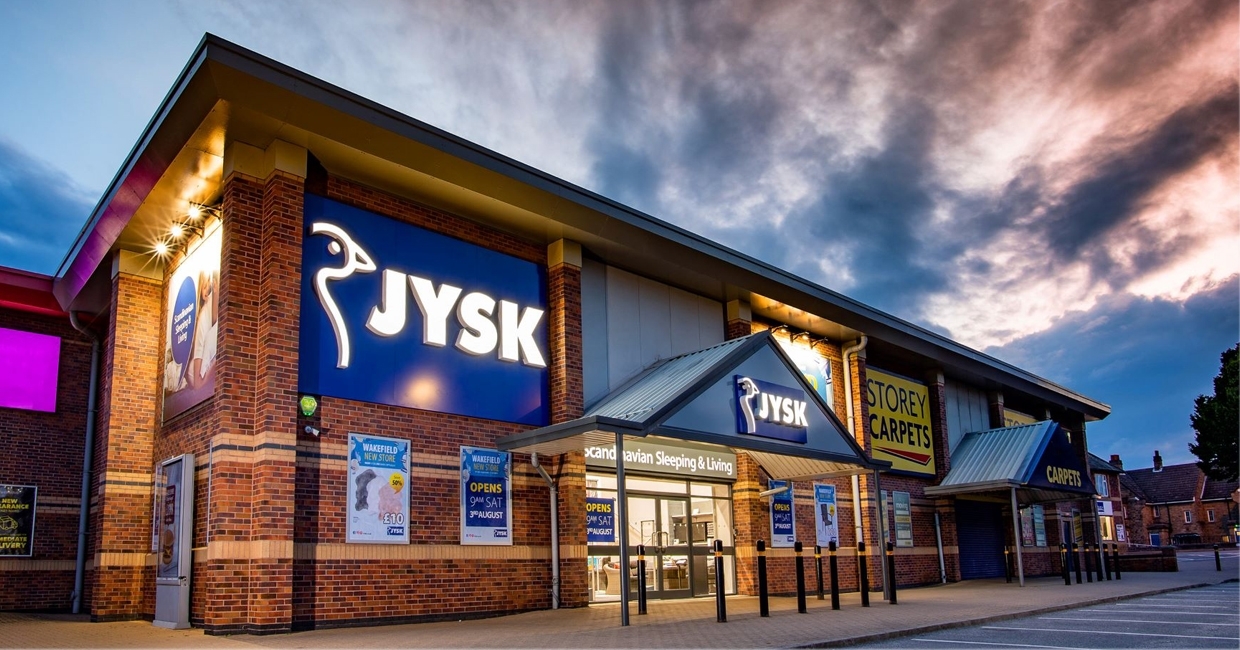It’s not the world’s biggest four-letter Scandinavian furniture export, but with more than 2800 stores across 54 countries, JYSK is no also-ran – and it’s looking to make good on the UK foothold it first established in 2008. With a five-year expansion plan culminating in 52 stores by August 2024, JYSK may well be coming to a retail park near you – Paul Farley speaks to the man leading the charge, country manager David Ashton …
In hindsight, 2008 wasn’t the best time to bring a new retail brand to the UK. “It was a difficult time for everyone,” says David, who is waiting for a flight at Amsterdam’s Schiphol. “We were lucky, though. We had a huge central resource to call on in Denmark, so while other companies entering the country may have had to employ up to 100 admin and management people, we only had to find around 20, and were able to concentrate on the sharp end of retail – our people, stores, products and customers.”
Eleven years on, JYSK is launching a renewed assault. Having planted its flag in Ireland, the dust is settling from store openings in St Helens, Bradford and Wakefield, which have taken its UK estate to 19.
“Denmark [JYSK’s global home] believe in the UK market, and what my team wants to achieve,” David states. “We have to succeed here – it’s a huge market, even if retail is struggling. And, right now, we’re not big, but we’re a lot more confident than we used to be because we know we have a great offer for the UK customer.”
When David left grocer Farmfoods to join JYSK in 2017, LFL sales were down -11%. That year, they recovered to +3%, then +21.5% the next. This year, David anticipates +8% LFL growth (+20% total growth, thanks to store expansion). In August alone, the business enjoyed +26.4% LFL growth (+48% in total).
“We were really struggling back then,” says David, “but we’re just doing things better now, with more control, and a lot of that is about finding the right people to be involved with our journey.”
Although rents and rates are still high, fluctuating demand and failing businesses mean almost unprecedented opportunity for brands to expand their physical estate, says David. “Landlords have woken up. With so much great space and people available in the market, now really is the time to expand.”

David Ashton
But rather than chasing the most immediately attractive audience catchments, JYSK plans to maximise brand awareness region by region – namely Yorkshire, the North-west and Midlands. That’s why David closed JYSK’s Bournemouth store last year, despite it delivering healthy growth (+26%).
“We don’t have any plans for the south coast for some time, so continuing to run the Bournemouth store was just strategically wrong,” he says, pointing out the distance between the outlet and the rest of JYSK’s estate. “We need to focus on certain areas of the UK where there’s enough of a population to really get a strong foothold.”
JYSK is now targeting market saturation. At its most extreme, this means clusters of stores which, like those in Wakefield, Pontefract and Dewsbury, are just 10-15 minutes’ drive apart. “Our primary focus remains in central and northern England,” says David, “and adding to the 19 stores we’ll finish FY19 with.”
This approach has also led to more concentrated marketing efforts. Three years ago, JYSK pulled its TV advertising when it realised there was no chance of gaining any meaningful traction through its existing footprint – but the new strategy means it can target promotions where it matters. “For example, we were targeting 6,000,000 people, but had just three stores in the North-west – the cost of acquisition was insane! But, if we want to do it again in the future, we’ll have reached a level of saturation that might make it feasible.”
In general, JYSK’s stores cover some 10-12,000 sqft of retail space, and are attractive, yet functional – there are no meatball cafes or self-serve warehouses in sight. They are, however, currently undergoing significant refurbishment, transitioning from what David calls a “basic 2.0” format (“metal frames, carpet tiles, strip lighting”) into a new iteration with more roomset displays, stronger decor, much better lighting and wooden flooring.
“Maybe our previous decor devalued our offer a bit,” muses David, “but we’re now getting the right look and feel. By August 2020 there will be more new-look stores in the UK than old – and they’re completely changing people’s perspective on our brand. When we refurbished our Lincoln store in May, we had existing customers telling us how wonderful it was to see so many new products – but those products weren’t new, just better presented!”
Product selection is where JYSK truly shines, offering good, better, best (Basic, Plus and Gold) price levels right across the home and garden spectrum. The prices span a vast range – customers can buy a dining table with two seats for as little as £20 or as much as £400, while a garden lounge set might set them back anything from £190 to £1350.
It’s the ideal proposition for value-oriented consumers, and has something of a Brexit-proof quality to it. “People always need things for their homes,” says David, “we just had to see where we could position ourselves in the market.
“Customers shop intelligently these days. Back in the recession, the middle classes still wanted lobster for dinner, but because times were hard, they’d come to Lidl [where David worked as a district manager from 2010-14] instead of Waitrose. Rather than hide it, people started to take pride in the fact they were savvy shoppers – even to the extent of showing off their shopping bags!
“In our case, we hear customers brag that their budget JYSK pillows are the same quality as those they’d find in more upmarket stores, and we’re in tune with that behaviour.”
The business carries out price checks against its competitors four times a year, but given the breadth of JYSK’s offer, it’s no mean feat. “We sell pretty much everything for the home, so it’s nigh-impossible to pick out any one competitor that’s very similar to us,” says David. “For example, if we’re comparing towels we’ll look at Asda, Dunelm, Wilko, Tesco and IKEA, but if we’re comparing garden furniture (and I firmly believe we’re the best garden retailer in the UK!) we’d look at B&Q, B&M and The Range against our Basic lines. We know the garden centres have a similar quality position against some of our garden furniture – but we really are a third of the price.
“In beds, we might compare ourselves with Dreams and Bensons. We’re very selective in our product range in that sector – we have 14 [UK-made] mattresses at the moment, but as we get larger, we’ll be able to justify making more UK FR-certified models.”
The scale of JYSK’s international operation already grants its UK arm access to some very well-priced goods – there are plenty of opportunities to be competitive when your group’s annual turnover is €3.58b. JYSK UK draws on a global assortment (primarily manufactured by suppliers in Denmark, the Far East, and increasingly Eastern Europe) and adapts some of it to suit.
“We’d be crazy not to use the buying power of the overall organisation, which gives us the ability to pass on great offers to the customers in the UK,” says David. “And there are other benefits to being part of a global operation. JYSK’s management comprises a wide array of cultures, so there’s a wealth of knowledge and different opinions on everything from marketing to staff management.”
David has a firm personal take on these topics, and this has played an instrumental part in JYSK’s recent achievements.
“Rather than splashing out on expensive TV advertising, our marketing chiefly comprises online geo-targeting and social media,” he says. Instead of labouring a sales message, JYSK UK has teamed up with popular lifestyle bloggers to convey its brand messaging more naturally. “I really believe in the power of the influencer,” says David, “but you have to be careful to work with the right ones. We’ve worked with many influencers and bloggers that have reached out to us because they already own so many JYSK products – so I’m confident the message they help us convey is one they believe in.”
He’s pleased by how readily customers have embraced JYSK’s high-value, one-stop-shop lifestyle messaging. “Customers much prefer seeing people actually using our products, and photos of our products in real people’s homes,” he says. “The UK is becoming more house-proud, and actively showing off their own interior schemes – and, thanks to our price points and on-trend, stylish designs, they can do that quite affordably.”

The message is conveyed equally clearly in-store, where staff are trained to serve customers honestly and effectively – no commissions or hard sell, just a programme that teaches them to “only sell according to the customer’s needs”. “Like everyone else, we’re in the world to make money,” says David, “but if you sell the customer something wrong they might return it – or worse, not return at all.”
JYSK strives to appoint managers from within its own ranks whenever possible (its internal recruitment target is 90%), and its localised expansion strategy lends itself to internal promotion.
“It’s important that we can create opportunities for people locally, so we don’t lose great talent because of those jobs being far away from home,” says David.
Indeed, JYSK tries to build employee investment at every turn, from frank and open internal communications (David regularly posts on the group’s Instagram, Facebook and Linkedin accounts) to treating them to a company-wide two-day Christmas shutdown. David says: “In retail, you generally think about work every day – but you can’t do that if your store is closed! It’s important to spend time with your loved ones without worrying about work. The value of staff morale is much more than the potential sales lost from one day’s trade.”
Each September, JYSK also shuts its stores for a big staff party, with the aim of building motivation and morale – this year’s shindig saw the UK staff (roughly 160 people) enjoy their own music festival.
“We want our stores to be a relaxed environment, and you need happy staff to achieve that,” explains David. “JYSK’s culture is quite Scandinavian, and I hope that comes across to our customers. We are open and honest, and every employee has the confidence to approach me – I love it.”
But JYSK is managing to chime with shoppers online, as well as off. Across the international business, the UK accounts for the highest share of online sales – currently 12-13% of its total – and it’s growing fast.
August saw +294% LFL growth – an astounding figure, yet reflective of some poor comparatives last year, when, in June, David took the “very difficult decision” to sacrifice JYSK’s Amazon sales. “These accounted for 15% of our online turnover, and, because they were often small items, 52% of our total online customer orders,” he reveals.
“But you can’t build a brand on Amazon – there’s no brand labelling, there are significant delays, and you have no ability to get customers’ details. To deliver great customer service, you need to be able to contact the customer directly. As a platform, Amazon may help many businesses, but if somebody asks you where you bought an item from, and you say Amazon, not JYSK, we develop no brand awareness as a channel.”
Impressive online growth, coupled with the rapid roll-out of new stores, mean JYSK has bold ambitions for its UK business.
“We’re forecasting LFL growth of +9% for September 2019 to August 2020, and plan to be at similar levels for the next two years until our 2024 financial year – that’s around 10% LFL growth each year,” explains David. “Of course, we’ll be operating from many more stores by then, so our total growth will be massive – something like +44% each year, potentially.”
The early signs are encouraging. When JYSK relocated its Lincoln store in May, it broke all its records for a grand opening weekend, taking a whole month’s sales in just two days. In June, the new St Helens store returned JYSK’s best-ever first day of trading from a new store.
“We know that retail in the UK is a challenging environment,” David concludes. “We would argue that UK retail is not dying – it is simply changing the ground rules. We must listen to the customer, we must be available for them on their terms, when and where they want us. Above all, we must ensure that every single person who gives up their time to visit JYSK, either in-store or online, knows that we are immensely grateful.”







